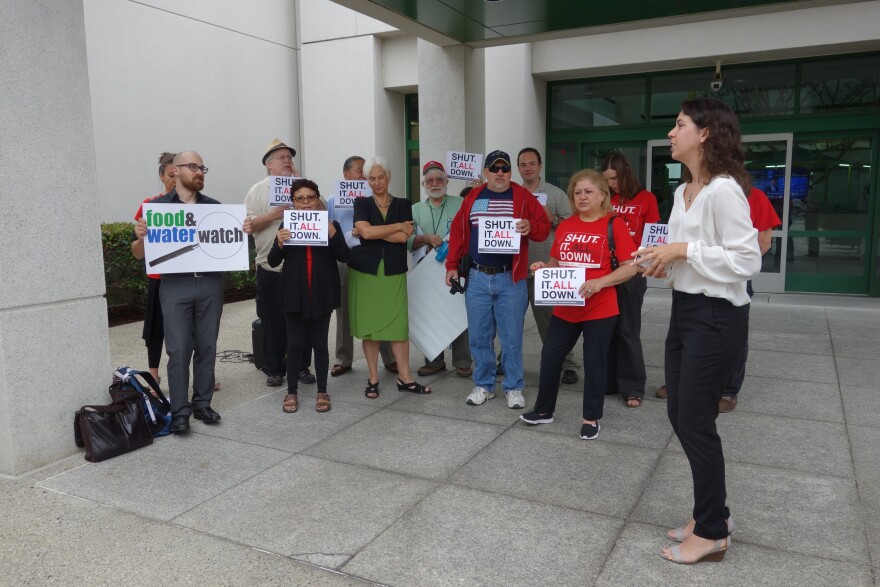This archival content was originally written for and published on KPCC.org. Keep in mind that links and images may no longer work — and references may be outdated.
California energy officials back off power outage predictions due to Porter Ranch gas leak

Earlier this year, California state energy officials predicted that the Los Angeles region could face up to 14 days of power outages this summer due to a lack of natural gas because of the shutdown of the Aliso Canyon storage field following a massive gas leak there.
Now, those same officials say they those predictions were overblown.
"Maybe quantifying it in number of days is not the best way of doing it," said Mark Rothleder, vice president of the California Independent System Operator, which oversees power transmission in the state.
In April, a panel of state energy officials, in collaboration with Southern California Gas Co., predicted 32 days of outages this year, including up to 14 during the months of March through October. The thinking was heat waves during those months would drive up demand for gas-generated power and that the lack of gas at Aliso Canyon would lead to shortages and blackouts.
State law permits the gas company to curtail supplies of gas to power plants, refineries, hospitals and other large business users when supplies are scarce.
But a cooler than expected summer so far and some mistaken assumptions about utility and consumer behavior help explain why the predicted power outages have not yet materialized, Rothleder said.
With two months of hot weather left in the year, a risk of outages remains. But Rothleder says it's best not to express that risk as a number of days.
"The problem with doing the number of days," he said, "You could go through a portion of the summer, or all summer, and not have an event, but it doesn't mean you don't have the risk."
The rupture of an aging natural gas well at Aliso Canyon last October turned into the nation's worst known release of natural gas. The leak was plugged in February. But state regulators have not allowed SoCal Gas to return the reservoir to normal gas storage until all 114 wells at the field have undergone inspections. In the meantime, no new injections of gas have been permitted.
In April, state energy officials from the Energy Commission, the Public Utilities Commission and Cal-ISO predicted outages were likely.
Members of the environmental groups Consumer Watchdog and Food & Water Watch and some Porter Ranch residents who want the gas field kept closed have long attacked the predictions as overblown.
At a news conference Friday, representatives from the groups said the predictions, which were calculated in collaboration with gas company employees, were meant to pressure the public and state to reopen the Aliso Canyon gas storage reservoir as soon as possible.
Meanwhile, state energy officials have been working with an independent panel of consultants to look at possible energy disruptions during the winter. They say that the risk of a natural gas shortage remains, but it is not as high was it was in the summer. They say power producers have taken a number of measures to reduce the risk of outages due to gas shortfalls, making outages less likely.
Where did the predictions fall short?
The initial predictions for sumer had some faulty premises, and did not take into account the behavior of power consumers and power plant operators, according to an independent analysis by scientists at Los Alamos National Laboratory.
"The issues that the review team found was that the risk due to planned and unplanned outages may have been overestimated," said Los Alamos scientist Anatoly Zlotnik.
Energy experts and SoCal Gas overestimated how often they would encounter small problems, he said. Also, the risk analysis was based in part on SoCal Gas' schedule of planned maintenance outages, each of which puts the system at some risk. But those tasks were delayed, removing some of the risk.
The analysis was done in March and early April, before the state asked power plants and utilities to take a series of 18 measures designed to reduce the chance of outages, and those seemed to work, Zlotnik said. For example, the utilities worked with their own power customers to reduce usage during times when demand for gas might be high.
"The potential curtailments (of gas supplies to power plants) seemed to have been prevented by the mitigation measures," Zlotnik said.
Those measures worked well enough that they will continue through the winter.
"The 18 measures we adopted this summer were not exactly easy to put in place," said Michael Picker, chairman of the Public Utilities Commission.
The power producers and a consortium of smaller industrial gas users all cooperated with measures to stretch the gas supply. One of those tactics was to order only as much gas as could be used with a much smaller margin of error, a practice known as balancing.
"They were critical to avoiding the potential for outages this summer," Picker said. "This has been a significant accomplishment and it didn't come without a lot of work, and some money, and I hate to say it again, but some luck."
